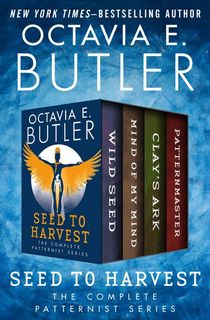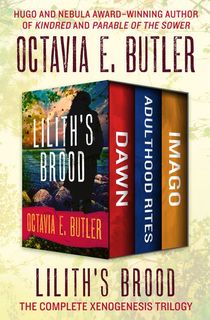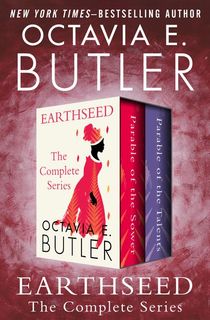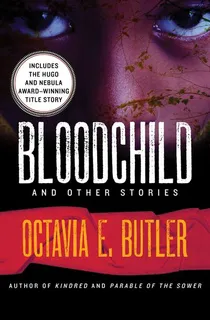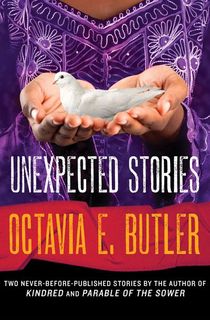It’s been over 16 years since her demise, and mostly I manage not to cry about our sad loss of a living, breathing Octavia Estelle Butler. But when I remember how deliberately she said what she said, how intentionally she acted the way she acted—how she wove a thread of purpose through all she did so that she’d leave everyone with a powerful impression of her grace and wisdom—that’s when I lose it. That’s when I weep.
Then I calm myself by remembering the rest of what she left behind.
There’s so much. Octavia Butler’s gifts to our community are multifarious, rich, and everlasting. From the moment I met her at a small, local science fiction convention in 1999, through the many theater shows and vegetarian meals we shared, through her heart-searing 2006 memorial service and beyond, I witnessed her blazing genius and unhesitating generosity firsthand.
I’ve long been her beneficiary and her champion; in recent years, while enjoying Octavia’s legacy myself, I’ve done my best to share it with others as well. I’ve tried to spread it far and wide. “Use me,” Octavia urged me during one of our last phone conversations. She did not want her gifts to go to waste.
They haven’t.

Once we had accepted the grim truth of Octavia’s body’s death, her friends and fans agreed on responding the same way: by creating a scholarship in her honor.
Because she’d studied at the original Clarion Writers Workshop, and because she’d taught several times at both of its currently running successors, we set up a scholarship to fund attendance at one of these. In the years that have passed since its 2007 inception, the Octavia E. Butler Memorial Scholarship Fund, administered by the Carl Brandon Society, has awarded full Clarion West and Clarion tuitions to 26 students.
From these 26 Butler Scholars (all of whom applied for the scholarship with poignant essays about the effects Octavia’s work has had on them), we’ve received over a hundred new stories—indirect but very real benefits to us of the life Octavia lived.
Among these stories there’s the Lambda Award-winning novel The Devourers, by Indian writer Indrapramit Das, 2012’s Clarion West Butler Scholar. There’s the novella by 2010 Clarion Butler Scholar, Kai Ashante Wilson, The Sorcerer of the Wildeeps, which won the Crawford Award in 2016. There’s This Town Sleeps, the 2021 debut novel by Ojibwa author Dennis Staples, Clarion West’s 2018 Butler Scholar. There’s “Voice of Gravaar” by 2013 Clarion West Butler Scholar Geetanjali Dighe, winner of the Door to a Pink Universe—a contest held in Octavia’s honor and named for the big pink notebook where she wrote her earliest tales.
There’s the fiction of acclaimed author and editor Chinelo Onwualu, 2014’s Clarion West Butler Scholar. Onwualu helped to found the Nigerian-based speculative fiction magazine Omenana, which has made her a sort of conduit for even more stories we get to inherit as part of the legacy of Octavia Butler.
Works by Butler scholars
So much of the literary estate Octavia has left us with comes via those she inspired. The groundbreaking Dark Matter anthology series owes its existence in part to one of her never-realized projects. In the 1980s, Octavia was supposed to edit Black Futures, a Dark Matter-like anthology of speculative fiction by Black authors, but she and Martin Greenberg, her co-conspirator, were unable to convince publishing’s gatekeepers that putting out that kind of book would be a sound business move.
Sheree Renée Thomas, who was recently appointed editor of the Magazine of Fantasy and Science Fiction, included a Butler story (“The Evening and the Morning and the Night”) in the first volume of the Dark Matter anthology series. Thomas understood that while Black science fiction’s origins are rooted far in the past, its lineage continues on through the work of contemporary visionaries like Samuel R. Delany, like Tananarive Due, and of course like Butler, who was still alive when the series’ first two volumes appeared.
And Thomas also knew, and demonstrated, that the strength of the genre’s beauty deepens with every fresh expression of it, and with the revelation of the connections between its iterations. Thomas’ Dark Matter series is both a fulfillment of and an expansion on Butler’s imagined Black Futures, and because it exists we enjoy not just the fine examples of the Black imagination curated within its pages, but the many the stories seeded and grown out of our access to its contents.
The success of the award-winning Dark Matter series has encouraged publishers to take the risk of producing similarly-themed anthologies, too: So Long Been Dreaming, Invisible Planets, Walking the Clouds, New Suns, The Year’s Best African Science Fiction, and others. These titles are a clear result of Thomas’ realization of Octavia’s dream.
An anthology with even more obvious ties to her is Octavia’s Brood. Its editors, Walidah Imarisha and adrienne maree brown, invited authors to contribute speculative stories exploring activist themes and advancing social justice, as Octavia Butler, the book’s namesake, did. “Visionary fiction,” Imarisha calls this subgenre. It uses fantasy, horror, and science fiction tropes to counteract humanity’s hierarchical tendencies—those tendencies Octavia so deplored, and which she liked to imagine us overcoming.
RELATED: Books About Octavia E. Butler
Though she wrote some magnificent short stories, it’s as a novelist Octavia’s best remembered, and it’s often in the work of novelists we feel her influence.
Tananarive Due’s 2009 horror novel Blood Colony may well have been the first book dedicated to Octavia’s memory. My 2016 debut novel, Everfair, is “For Octavia, who knew this day would come.” Margaret Killjoy’s latest fantasy, A Country of Ghosts, is the second publication in AK Press’ Black Dawn series, which “honors anarchist traditions and the great Octavia E. Butler’s legacy.”
These are a few of my favorite things to think about when I find myself grieving over our loss. These are the portions given us; these are the gifts we receive as part of Octavia Butler’s living legacy. If reflecting on their glory turns out not to be enough to calm my sorrow—which does happen—I comfort myself with the certainty that as time goes on, there will be more.
About the author
A friend of Octavia’s during her Seattle years, Nisi Shawl is a founder of the diversity-in-speculative-fiction nonprofit The Carl Brandon Society. Honors received include the Locus, World Fantasy, Otherwise, and Kate Wilhelm Solstice awards. Shawl edited Bloodchildren: Stories by the Octavia E. Butler Scholars; they co-edited Strange Matings: Science Fiction, Feminism, African American Voices, and Octavia E. Butler. Their debut novel, Everfair, was a 2016 Nebula finalist. Fruiting Bodies, their latest short story collection, is forthcoming in October 2022. Shawl’s Middle Grade historical fantasy Speculation is due out in January 2023, to be followed soon after by New Suns 2, the sequel to their acclaimed anthology New Suns: Original Speculative Fiction by People of Color. They like to relax by pretending they live in other people’s houses.
Want more Butler? Download her books today!




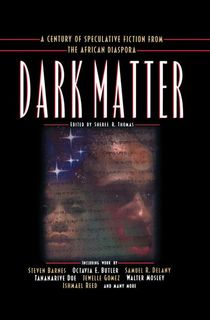



.jpeg?w=640)
